Are you enjoying a pint and curious about how breweries ensure every batch tastes just as good as the last? Did you know that beer production requires intricate quality control measures to protect its consistency and flavour? This article enlightens you on the science behind your favorite brew, outlining effective methods employed by brewers.
Get ready for an intriguing journey through hops, barley and yeast all in quest of perfecting a refreshing pint!
Key Takeaways
- Quality control measures in beer production are essential to ensure consistency, freshness, and high-quality standards.
- Bright tank testing is a crucial quality control measure that helps identify any defects or contamination in the beer before it reaches consumers.
- Good Manufacturing Practices (GMPs) and Quality Assurance (QA) programs are important for ensuring safe and high-quality beer production.
- Key quality control measures in the brewing process include monitoring quality measurements, conducting wort analysis, controlling fermentation, managing yeast effectively, and maintaining thorough documentation.
Importance of Quality Control in Beer Production

Quality control is vital for ensuring the consistency and freshness of the beer product, which can be achieved through measures such as bright tank testing, adherence to good manufacturing practices (GMPs), and implementing robust quality assurance (QA) programs.
Consistency and freshness of the product

Making beer the same way every time is key. This is what we call consistency. Freshness also matters a lot in beer making. Beer made today must taste just as good months later too! To do these, brewers taste beers daily and use special tools to measure things.
These steps help keep the taste of your favourite brew the same each time you drink it.
Bright tank testing
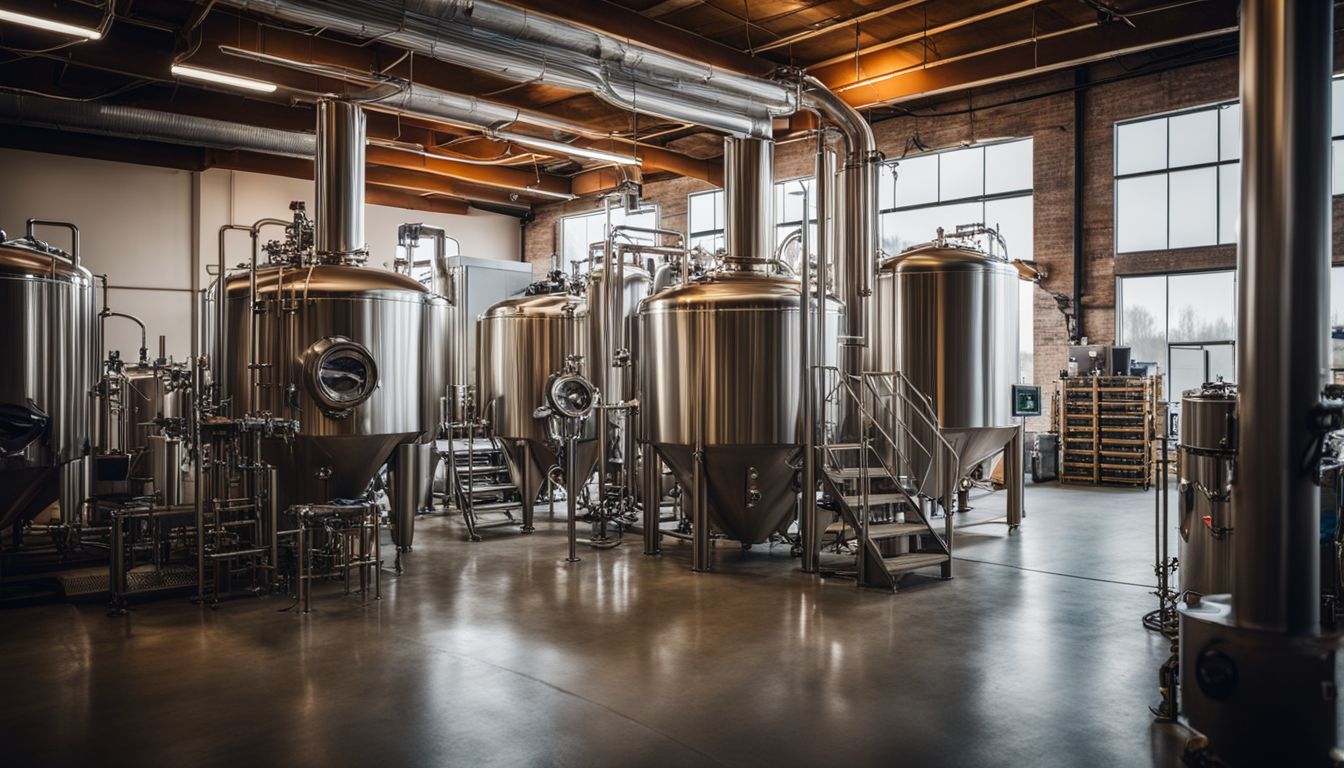
Bright tank testing is a crucial quality control measure in beer production. It helps ensure that the beer is free from any defects or contamination before it reaches the consumer.
During bright tank testing, samples of the beer are taken and analyzed for various parameters such as clarity, carbonation, and flavor profile. This helps brewers identify any issues and make necessary adjustments to maintain consistent product quality.
Bright tank testing tools are user-friendly and designed specifically for breweries to easily conduct these tests. By conducting regular bright tank testing, breweries can ensure that they are delivering high-quality beers that meet their customers’ expectations for taste and freshness.
Good Manufacturing Practices (GMPs)
-93269b1797-236048416.jpg)
Good Manufacturing Practices (GMPs) are important in beer production. They help ensure that the beer is made safely and with high quality standards. Here are some key GMPs followed by brewers:
- Regular cleaning of equipment to prevent contamination.
- Proper labeling and storage of ingredients to avoid mix-ups.
- Implementing sanitation procedures to maintain a clean brewing environment.
- Training staff on proper handling of equipment and ingredients.
- Adhering to safety regulations to protect both employees and consumers.
Quality Assurance (QA) programs
-programs-022314e019-870531312.jpg)
Quality Assurance (QA) programs play a vital role in ensuring the quality and consistency of beer production. These programs are designed to measure specific conditions throughout the brewing process, from raw materials to the final product.
By implementing QA protocols, breweries can ensure that their beers meet industry standards and deliver a consistent taste experience for consumers. Through regular testing and analysis, brewers can identify any deviations or potential issues in the production process and take corrective actions accordingly.
This helps maintain high-quality standards, reduces the risk of spoilage or contamination, and ultimately enhances customer satisfaction with every sip of their favorite brew.
Key Quality Control Measures in Brewing Process

In the brewing process, key quality control measures include monitoring quality measurements, conducting wort analysis, ensuring fermentation control, managing yeast effectively, and maintaining thorough documentation.
These measures are crucial for producing high-quality beer that meets industry standards. Read on to learn more about the importance of quality control in beer production.
Monitoring quality measurements

In beer production, it’s important to monitor quality measurements. This helps ensure that the beer meets the high standards that customers expect. Here are some key quality measurements that brewers keep an eye on:
- Consistency and freshness of the product: Brewers want to make sure that every batch of beer tastes the same and is fresh when it reaches the customer.
- Bright tank testing: This involves checking the clarity, color, and carbonation levels of the beer before it is packaged.
- Good Manufacturing Practices (GMPs): These are guidelines followed by breweries to ensure that all steps in the brewing process meet quality standards.
- Quality Assurance (QA) programs: Breweries have QA programs in place to measure specific conditions throughout the brewing process. This ensures that the beer meets their intended standards.
Wort analysis
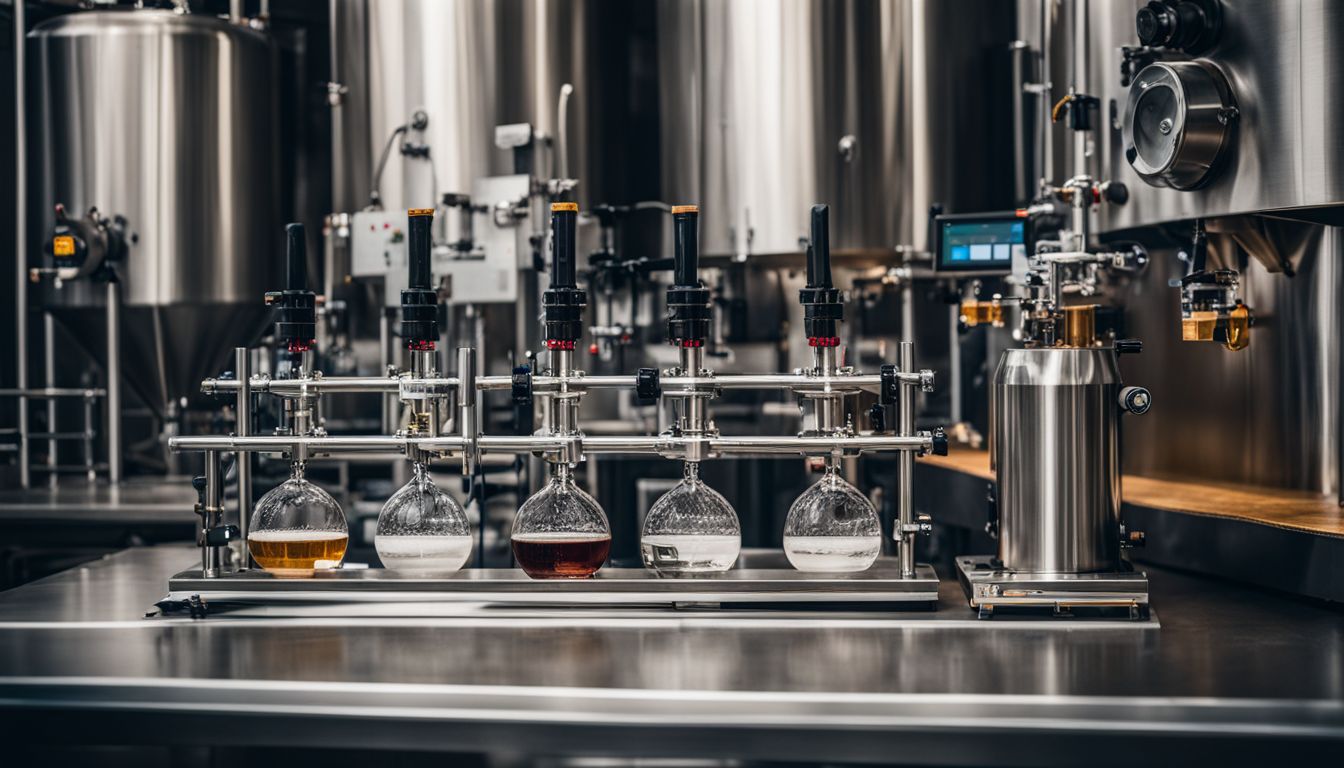
Wort analysis is an important quality control measure in the beer brewing process. It involves testing and analyzing the wort, which is the liquid extracted from malted grains during brewing.
By analyzing the wort, brewers can ensure that it meets specific quality parameters and will ferment properly. This analysis helps to determine things like sugar content, pH levels, and hop bitterness.
By monitoring these factors, breweries can maintain consistency and produce high-quality beers. Wort analysis also allows brewers to identify any issues early on in the brewing process and make necessary adjustments to achieve the desired flavor profile.
Fermentation control
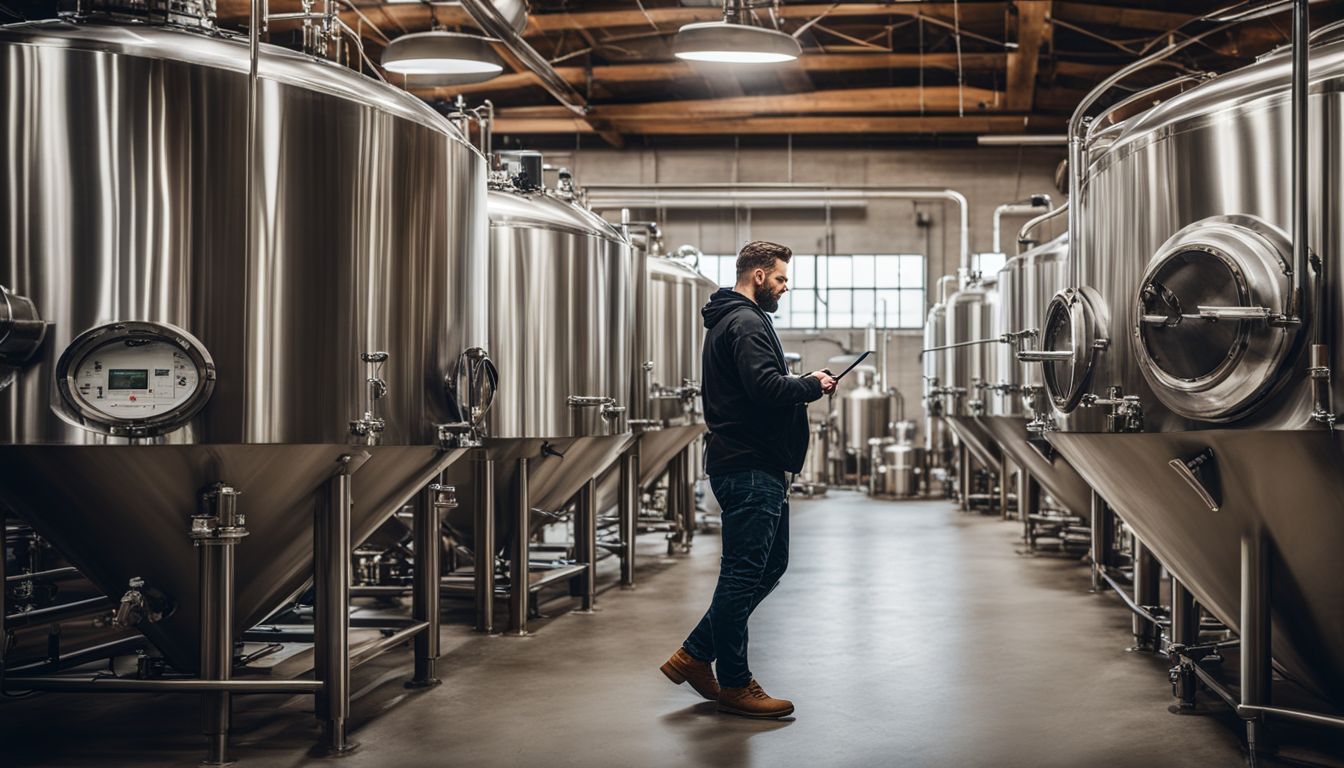
Fermentation control is a vital quality control measure in beer production. During fermentation, yeast converts sugars into alcohol and carbon dioxide, giving beer its unique flavor and aroma.
It’s crucial to maintain the right temperature and conditions for fermentation to ensure consistent and high-quality beer. By carefully controlling the fermentation process, brewers can achieve desired flavors, avoid off-flavors, and ensure that the beer meets quality standards.
This helps to provide customers with a great-tasting product that they can enjoy every time they have a pint of their favorite craft beer.
Yeast management

Yeast management is a crucial aspect of quality control in beer production. Yeast plays a vital role in fermentation, which determines the flavor and alcohol content of the beer. It’s important for brewers to monitor and maintain yeast health throughout the brewing process.
By ensuring that yeast is properly handled and stored, brewers can ensure consistent product quality. Proper yeast management helps prevent off-flavors and contamination, resulting in a better-tasting beer for you to enjoy.
So next time you raise your glass, know that behind every great brew is careful yeast management!
Documentation

Proper documentation is a crucial aspect of quality control in beer production. Brewers need to keep detailed records of the entire brewing process, from the raw materials used to the final product.
These records help ensure consistency and traceability, allowing brewers to identify any issues that may arise during production. By documenting each step, breweries can maintain high-quality standards and make improvements where necessary.
This includes recording measurements, test results, and any adjustments made along the way. Having accurate documentation also helps with regulatory compliance and enhances transparency in the brewing industry.
In addition to keeping track of the brewing process, documentation is important for inventory management and quality assurance programs. It allows brewers to track ingredient usage, monitor stock levels, and ensure that all products meet quality control protocols.
Moreover, proper documentation enables brewers to conduct thorough analyses on their beer’s sensory characteristics over time. By reviewing past records, breweries can gain insights into how their beers have evolved and make informed decisions about future production techniques.
Tools and Equipment for Quality Control

Bright tank testing tools are essential for ensuring the quality and consistency of beer production. From lab equipment for analysis to yeast management tools, these user-friendly instruments play a crucial role in maintaining high-quality standards throughout the brewing process.
Discover which tools are key for effective quality control in beer production!
Bright tank testing tools

Bright tank testing tools are essential for ensuring the quality and consistency of beer. These tools help brewers monitor the beer’s characteristics and identify any issues that may affect its taste and freshness. Some commonly used bright tank testing tools include:
- Hydrometers: These tools measure the specific gravity of the beer, which indicates its alcohol content and fermentation progress.
- Dissolved Oxygen Meters: Oxygen can negatively impact the flavor and shelf life of beer. Dissolved oxygen meters help brewers monitor oxygen levels in the beer during different stages of production.
- pH Meters: pH is an important parameter that affects the taste and stability of beer. pH meters allow brewers to measure and adjust the acidity levels throughout the brewing process.
- Carbonation Testers: Carbonation plays a crucial role in determining the mouthfeel and overall drinking experience of beer. Carbonation testers help ensure that beers have a consistent level of carbonation.
- Temperature Sensors: Temperature control is vital during fermentation to achieve desired flavors and aromas in the beer. Brewers use temperature sensors to monitor and maintain optimal temperatures during fermentation.
Lab equipment for analysis
Laboratory equipment is important for analyzing the quality of beer. Here are some tools used in beer analysis:
- Spectrophotometer: Measures the color and clarity of beer, ensuring it meets specific standards.
- pH meter: Determines the acidity levels in beer, as proper pH balance is crucial for taste and stability.
- Refractometer: Measures the sugar content in wort and helps determine fermentation progress.
- Gas chromatograph: Analyzes volatile compounds in beer, ensuring they are at desired levels.
- Microscope: Used to examine yeast cells, ensuring healthy fermentation and avoiding contamination.
- Dissolved oxygen meter: Monitors oxygen levels during packaging to prevent off-flavors and spoilage.
- Force carbonation system: Allows brewers to accurately control carbonation levels in finished beer.
Yeast management tools
Yeast management is crucial in beer production to ensure the quality and consistency of the end product. Here are some tools that brewers use to manage yeast effectively:
- Yeast Propagation Equipment: Brewers use specialized equipment to propagate yeast cultures, allowing them to grow and multiply before being added to the fermentation process.
- Yeast Pitching Rate Calculators: These tools help brewers calculate the optimal amount of yeast needed for fermentation based on factors like batch size and desired beer style.
- Yeast Nutrient Additions: Brewers may add specific nutrients to the fermentation process to support healthy yeast growth and activity, ensuring a clean and complete fermentation.
- Yeast Harvesting Tools: Brewers can harvest and reuse yeast from previous batches, reducing costs and maintaining consistency in flavor profiles.
- Microscope and Viability Testing Equipment: By using microscopes and viability testing kits, brewers can assess the health and viability of yeast cells, ensuring only active yeast is used in fermentation.
Documentation systems
Effective quality control in beer production relies on comprehensive documentation systems. These systems help breweries maintain consistency and track every step of the brewing process. Here are some important aspects of documentation systems:
- Standard operating procedures (SOPs) provide clear instructions for each stage of brewing, ensuring that processes are carried out consistently.
- Batch records document key details such as ingredients, equipment used, and process parameters for each batch of beer produced.
- Quality control checklists outline the tests and measurements to be performed at various stages of production, ensuring adherence to quality standards.
- Logbooks allow brewers to record important data such as fermentation temperatures, pH levels, yeast viability, and sensory evaluations.
- Traceability systems track the origins of raw materials and their journey through the production process, enabling quick identification and recall in case of any issues.
Benefits of Effective Quality Control in Beer Production
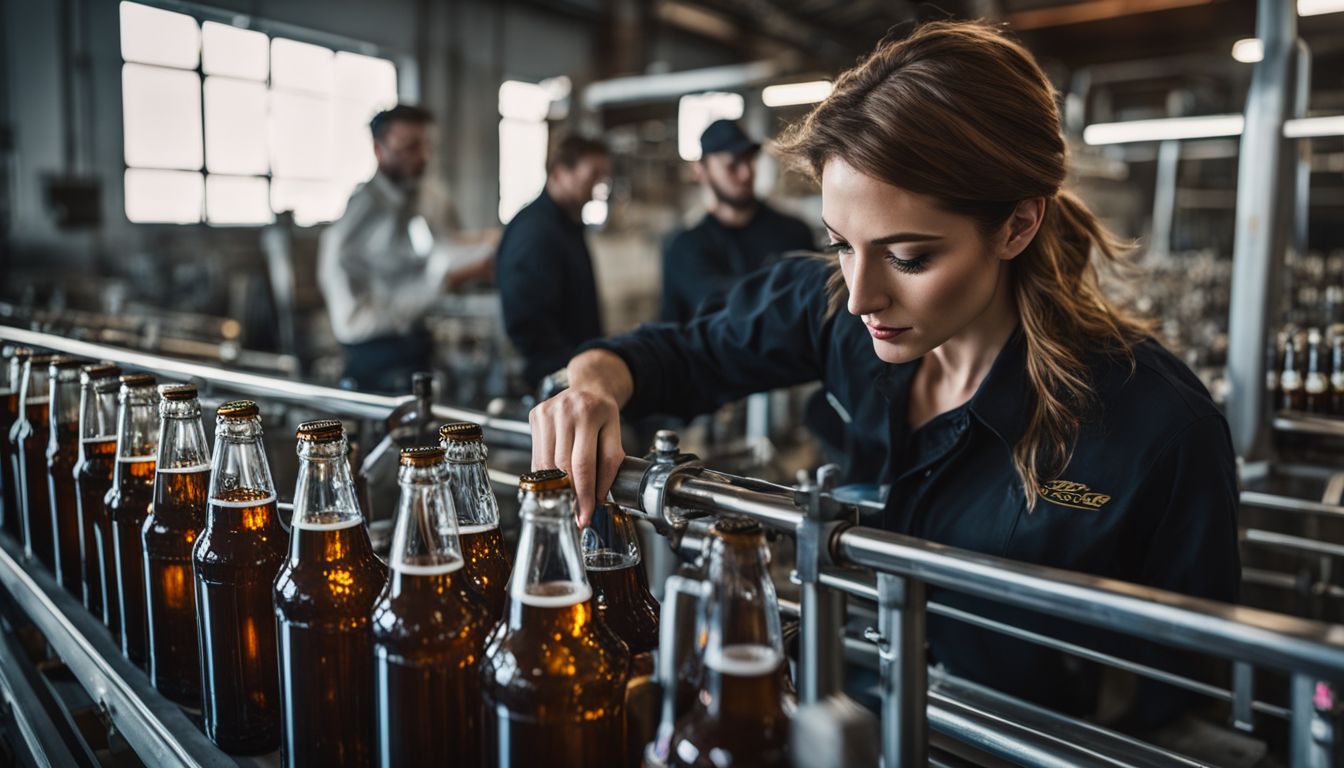
Effective quality control in beer production ensures consistent and fresh products, maintains high-quality standards, reduces the risk of spoilage and contamination, and enhances customer satisfaction.
Ensures product consistency and freshness
Quality control measures in beer production are crucial to ensure that every sip you take is consistent and fresh. Brewers work hard to maintain the same taste and quality in each batch of beer they produce.
They carefully monitor all stages of the brewing process, from selecting high-quality ingredients to fermenting the beer at just the right temperature. By doing this, they can guarantee that every bottle or pint you enjoy will have that perfect flavor you love.
This attention to detail ensures that each time you reach for a cold one, it will be as refreshing and satisfying as the last. So next time you raise your glass, know that there’s a whole team behind it making sure it meets the highest standards of consistency and freshness!
Maintains high-quality standards
Maintaining high-quality standards is a crucial aspect of beer production. It ensures that every bottle or can you enjoy meets the highest standards of taste and freshness. By implementing effective quality control measures, breweries are able to consistently produce beers that meet customer expectations.
This means that each batch of beer undergoes rigorous testing and analysis throughout the brewing process, from monitoring quality measurements to conducting sensory analysis. By adhering to strict quality control protocols, breweries can ensure that their beer maintains a consistent level of excellence and delivers a satisfying experience with every sip.
Reduces the risk of spoilage and contamination
Quality control measures in beer production play a crucial role in reducing the risk of spoilage and contamination. By implementing rigorous testing and monitoring processes, breweries can ensure that their products are safe for consumption.
This involves regularly inspecting raw materials, conducting thorough analysis at various stages of the brewing process, and maintaining proper sanitation practices. Through these efforts, breweries can identify any potential issues early on and take necessary corrective actions to prevent spoilage or contamination.
By prioritizing quality control, breweries can maintain the integrity and freshness of their beers, providing customers with a safe and enjoyable drinking experience.
Enhances customer satisfaction
Effective quality control measures in beer production play a key role in enhancing customer satisfaction. When breweries focus on maintaining consistent and high-quality standards, it ensures that every sip of their beer is enjoyed by customers.
By closely monitoring the brewing process and conducting regular quality control tests, brewers can ensure that the taste, aroma, and freshness of their beers remain top-notch. This attention to quality also reduces the risk of spoilage or contamination, providing customers with a safe and enjoyable drinking experience.
With effective quality control measures in place, breweries can meet consumer expectations and keep them coming back for more delicious brews.
Conclusion
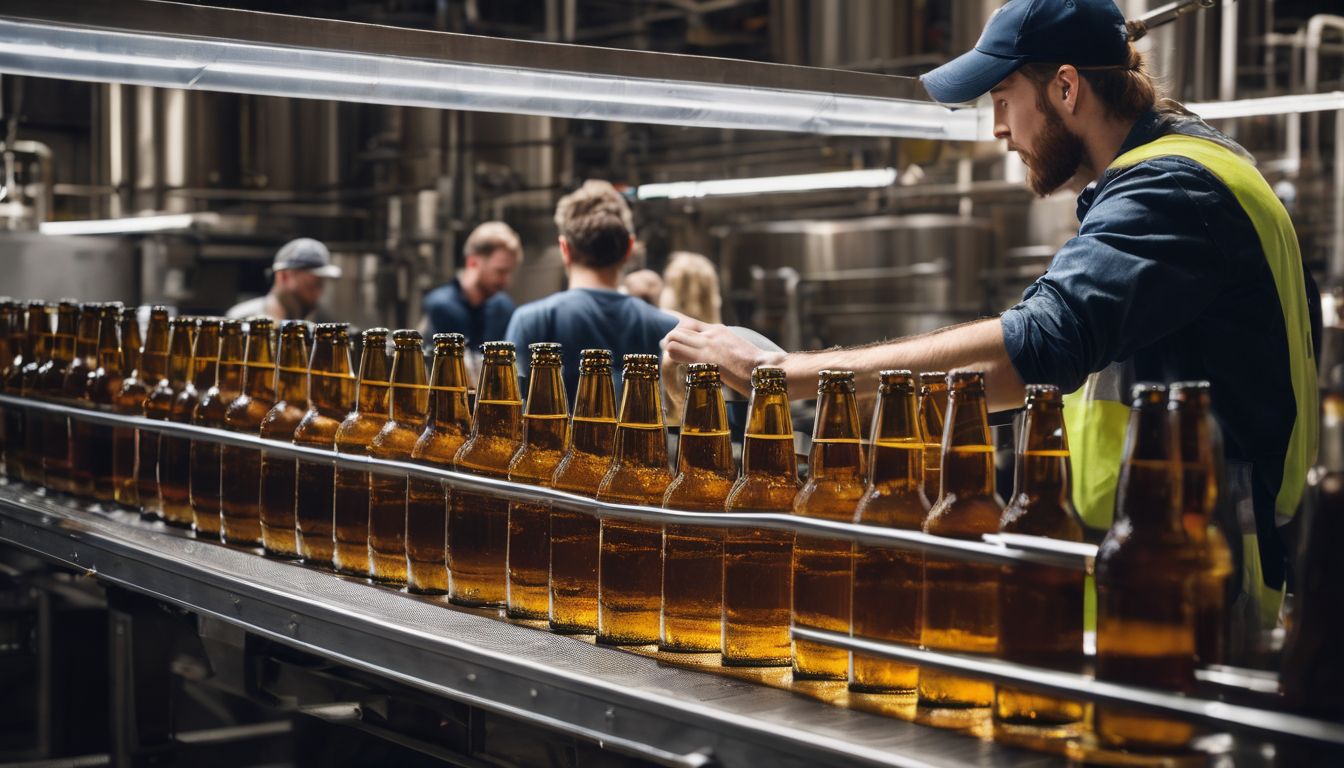
In conclusion, effective quality control measures play a vital role in beer production. By monitoring and managing the brewing process, breweries can ensure consistency, freshness, and high-quality standards.
This not only reduces the risk of spoilage and contamination but also enhances customer satisfaction. With the right tools and equipment, along with strict quality control protocols, breweries can maintain their reputation for producing great-tasting beers that meet industry standards.
FAQs
1. Why is quality control important in beer production?
Quality control is important in beer production to ensure that the final product meets customer expectations, maintains consistency, and complies with safety and regulatory standards.
2. What are some common quality control measures used in beer production?
Common quality control measures in beer production include regular testing for alcohol content, pH levels, dissolved oxygen, microbial contamination, and sensory evaluation for taste, aroma, and appearance.
3. Who is responsible for implementing quality control measures in beer production?
The brewery’s quality assurance team or specialists are responsible for implementing and monitoring quality control measures throughout the various stages of beer production.
4. How does effective quality control benefit both breweries and consumers?
Effective quality control benefits breweries by reducing waste and ensuring consistent product quality while also providing consumers with a safe and enjoyable drinking experience through reliable taste profiles and adherence to industry standards.
